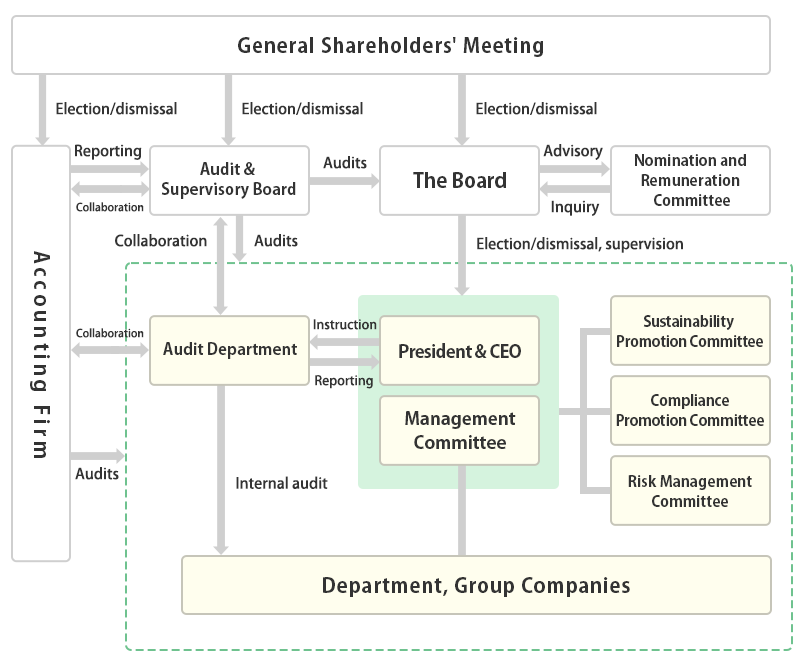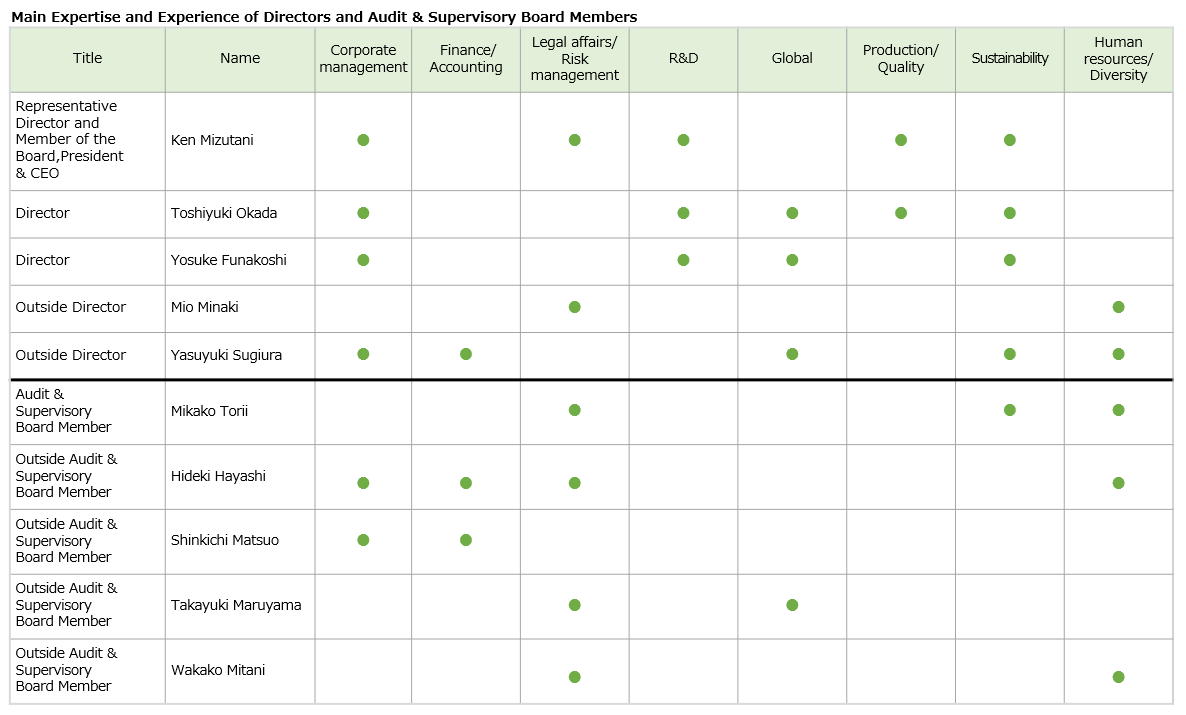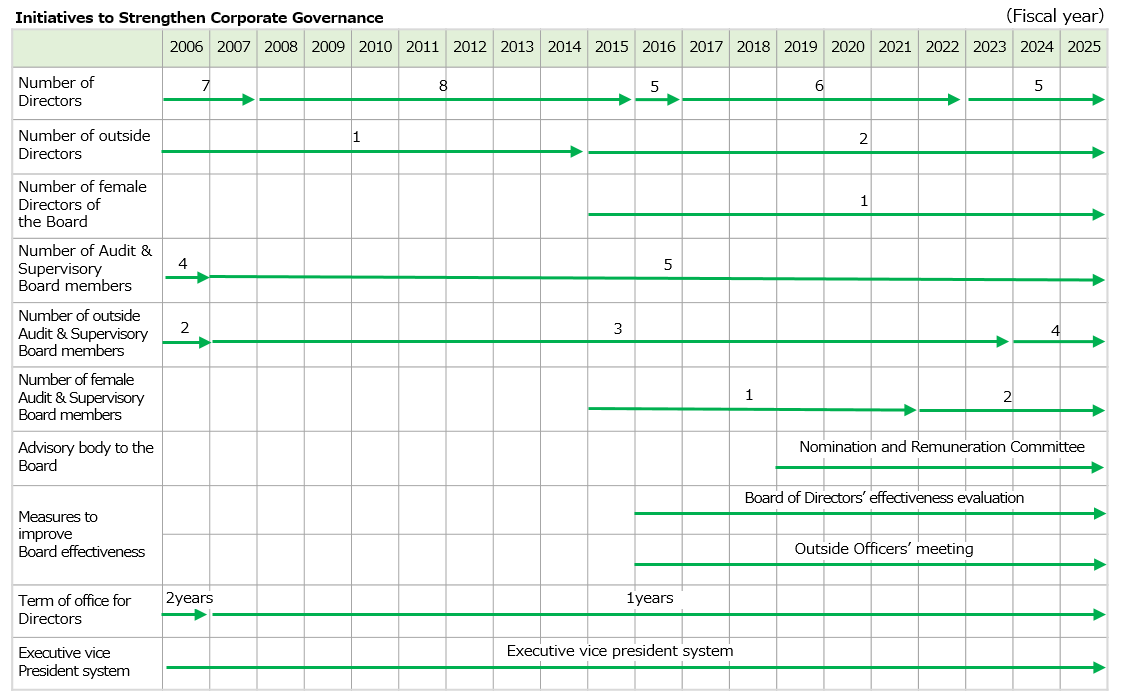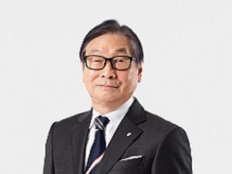In accordance with the Creed “We create safe and useful products for human well-being with basic research based on glycoscience,” on the basis of profound awareness of our social mission and responsibilities as a pharmaceutical company, Seikagaku seeks to increase the speed of transparent and fair decision-making and strengthen oversight of business execution and is focusing on development of internal control systems, including for compliance and risk management. Our policy is to aim for sustainable growth and corporate value enhancement by striving to further strengthen corporate governance, which we view as an important management priority, and building a management system that rewards the trust of our shareholders and other stakeholders, and of society at large, through these initiatives.
The Company has adopted a Company with an Audit & Supervisory Board governance system, having determined that the most effective and appropriate form of corporate governance for the Company is for the Board of Directors to oversee business execution and for the Audit & Supervisory Board to perform auditing and oversight in cooperation with the accounting auditor and Audit Department. Furthermore, the Company has introduced an executive vice president system to separate management oversight by the Board of Directors from business execution and holds weekly Management Committee meetings to confer and decide important management agendas, based on the basic policy of the Board of Directors.
The Board of Directors has established the Nomination and Remuneration Committee, which consists of the president & CEO and all outside members of the Board, to advise on matters concerning nomination of candidates for members of the Board and compensation.
The Compliance Committee promotes various programs to improve compliance effectiveness, and the Risk
Management Committee appropriately manages business risks and implements risk prevention measures
Furthermore, the Sustainability Promotion Committee discusses the policy on sustainability-related activities and promotion activities and supervises promotion activities, and the Compliance Promotion Committee promotes various measures that increase compliance effectiveness. Also, by establishing the Risk Management Committee, we have put in place a structure that appropriately manages business risks and implements preventive measures.

Board of Directors
The Board of Directors comprises five members, including two outside members of the Board. The Company aims to enhance management oversight from an independent standpoint by appointing outside members of the Board to one-third of the Board seats.
The Board makes decisions on tasks stipulated in laws, the Articles of Incorporation, and rules for the Board, such as basic management policy, the mid-term management plan, the annual management plan, and election of executive vice presidents. The Board decides on important business and supervises the performance of business operations and oversees business execution. The Board holds regular monthly meetings and, if necessary, additional meetings of the Board are convened.
To enable sufficient deliberation at Board meetings, as a rule, materials on matters for resolution and reporting matters are distributed to the Board members at least three days before meetings to provide time to review the materials. Also, advance explanations of important agenda items are provided, as well as additional materials and supplemental explanations upon request.
A meeting of outside officers, comprising all the outside members of the Board and outside Audit & Supervisory Board members, periodically analyzes and evaluates the effectiveness of the Board of Directors. The Board deliberates the evaluation results and undertakes improvement of Board operation.
All two outside members of the Board are reported to the Tokyo Stock Exchange, Inc. as independent officers by the Company.
To achieve sustained growth and medium- and long-term enhancement of corporate value, following deliberation by the Nomination and Remuneration Committee, the Board of Directors determines skills required by the Board on the basis of basic management policy, the mid-term management plan, and other criteria. To maintain a structure capable of effectively fulfilling the Board’s role and duties, the Board selects candidates for corporate officer positions taking into consideration their knowledge, experience, abilities, and character, in addition to specific skills and Board diversity.
Since the skills required by the Board of Directors constantly change according to the business environment and other factors, the Company plans to periodically review them. The term of office for members of the Board is one year with the aim of creating a management structure that would be able to adapt quickly and flexibly to changes in the business environment.
The outside members of the Board are responsible for oversight from an objective standpoint, a perspective that incorporates the common interests of shareholders, and is based on expert knowledge and insights into corporate management. The outside members of the Board also attend meetings held among the president & CEO, Audit & Supervisory Board members, and heads of each department to share views of the Company’s business issues and the external environment.

Nomination and Remuneration Committee
In the interest of increasing fairness, transparency, and objectivity of procedures relating to the nomination and remuneration of members of the Board of Directors, Seikagaku has established the Nomination and Remuneration Committee, comprising the president & CEO and both independent outside members of the Board, as a voluntary advisory body to the Board.
The committee deliberates and reports to the Board of Directors on its views on the composition of the Board, matters relating to the selection and dismissal of members of the Board and Audit & Supervisory Board members, and matters relating to remuneration for members of the Board. The committee also decides the amount of monetary compensation for individual members of the Board and other matters for which decision-making has been delegated by the Board of Directors.
In fiscal 2025, the committee deliberated the selection of candidates for members of the Board and matters relating to determining remuneration for members of the Board as well as the Policy for Determining the Details of Individual Remuneration for Members of the Board and Audit & Supervisory Board Members.
The Audit & Supervisory Board comprises five members, including four outside members. Its duties include discussing and deciding important audit-related matters and confirming in advance matters for resolution by the Board of Directors.
Audit & Supervisory Board members attend meetings of the Board of Directors and express their opinions as necessary and also interview directors in charge and corporate officers of subsidiaries in accordance with an annual plan, and exchange views with the president & CEO. They also have periodic meetings with the accounting auditor and Audit Department and receive audit reports, audit results, and other reports, exchange views, and strive for cooperation.
The full-time members attend Management Committee meetings and other important meetings; examine minutes, approval documents, and other important documents; perform audits of business sites; and share information about business execution and development of the internal control system and confirmation of its status of operation with the outside members at Audit & Supervisory Board meetings.
The outside members suitably perform supervision of the Board members’ execution of duties from an objective standpoint, a perspective that incorporates the common interests of shareholders, based on expert knowledge and insights into corporate management. All four outside Audit & Supervisory Board members are reported to the Tokyo Stock Exchange, Inc. as independent officers by the Company.














